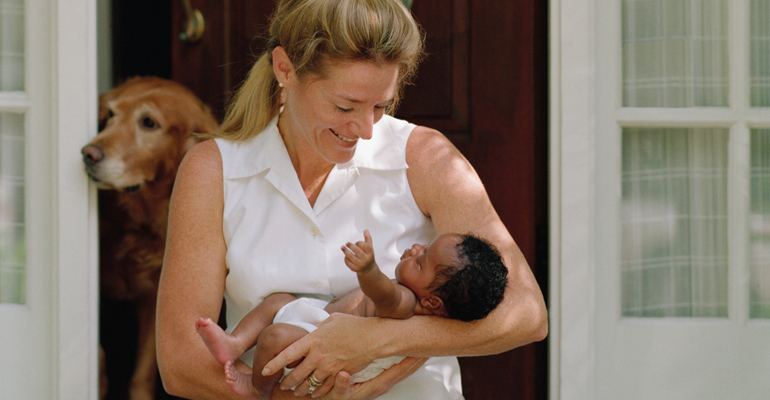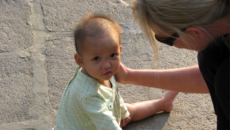If you have a “furry-faced child,” you know what love and comfort he can provide. But if you’re planning to adopt a baby, you’ll need to prepare your pet for the new arrival and reassure him of his place in the family. Here are a few ways to ease the transition:
- Teach your pet social skills. Early in the adoption process, give your pet opportunities to be around babies and children. Put your dog on a leash and take him to the park or another place where he can see, hear, and sniff little kids. Keep treats in your pockets to give to your pet when he behaves well.
- Have a play date. Try to get your cat or dog accustomed to being around children in your home before the baby arrives. Host your friends who have young kids, and reward your pet for appropriate behavior. If you’re not sure how your pet will react, put up a baby gate and allow him to observe the visitors from afar. Cats are happiest — and feel safest — when they can get up high to observe the action, so provide your kitty with a safe perch on a windowsill, couch back, or countertop.
- Invest in training. Obedience classes are worth their weight in gold for the puppy or older dog who will soon live with a baby. An experienced trainer can help you avoid common pitfalls once the baby arrives.Although most family cats are not formally trained, help your cat get accustomed to spending time in a room or bathroom with a bed, litter box, food, and water. After the baby arrives, your cat may find this space to be a respite from the hubbub.
- Teach your pet the lay of the land. Set up your baby’s room a few weeks before she arrives so your pet can become familiar with it. Let your animal sniff and explore the room, but be clear about boundaries. If your pet tries to jump into the baby’s crib, for instance, firmly say, “No!” and remove him. Reward your pet generously for good behavior.
- Plan a warm reunion. When you arrive home with your baby, greet your pet enthusiastically and spend a few minutes alone with him. Before making a formal introduction, give your pet something to sniff that contains the baby’s scent. Pat him gently and offer him treats as he smells the item.If you have crate-trained your dog, or if there is a safe perch or room for your cat, secure your pet before bringing in the baby. Once the baby enters the room, release the animal, with supervision, or put him on a leash. While holding your baby, let your pet carefully sniff her.
- Don’t neglect your “first child.” Once you’ve settled into a routine, make time to interact with your pet. Take your dog on walks with your baby and make a point of playing with your pet during the baby’s nap time. Reward him with toys and treats whenever he is gentle and kind to the baby.



